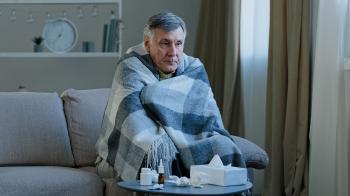In-Home Care Tips for Senior Internal Temperature Regulation
May 19, 2023

Seniors go through a number of changes as they age. Some of these changes might cause them to have issues regulating their body temperature. Additionally, seniors might take medications that interfere with their ability to maintain a healthy internal temperature. This situation can be frustrating for seniors as they struggle to be comfortable. Thankfully, there are a few things loved ones and in-home care providers can do to help seniors as they navigate these changes.
This article helps explain why seniors might feel colder as they age and provides tips to assist them in maintaining their temperature.
Why Do Seniors Struggle With Internal Temperature?
There are several reasons why seniors might struggle with internal temperature regulation. Understanding the why may help decrease frustration and create solutions.
- Reduced metabolism: As seniors age, the rate at which their metabolism works slows down, making it more difficult to create heat and keep their internal temperature at a comfortable level. A reduced muscular mass, which often occurs with aging, is another factor that contributes to a slower metabolism.
- Decreased circulation: Aging causes blood vessels to constrict and become less elastic, which reduces blood flow to the extremities and causes seniors to feel colder. Seniors with significant issues should talk with their medical professionals about a condition called Raynaud's disease, which makes the extremities, including the fingers and toes, feel numb and chilly.
- Medications: As mentioned earlier, there are a number of medications routinely prescribed to seniors that impact their capacity to regulate temperature. Some examples of these medications are blood pressure medications or diuretics. Seniors and loved ones should talk with medical professionals to understand what effect their medication might have on temperature regulation.
- Chronic conditions: Seniors who struggle to maintain a healthy body temperature may have difficulty doing so if they suffer from a chronic illness such as diabetes, hypothyroidism, or anemia.
What Can Seniors Do to Regulate Their Internal Body Temperature?
There are a few things that seniors can do, with the assistance of in-home care providers and loved ones, to maintain a healthy body temperature. The first of these is to pay attention to the temperature inside the home and ensure that it is consistent. A good temperature range would be between 68 and 75 degrees Fahrenheit.
Loved ones can also encourage seniors to layer their clothing. Moisture-wicking clothing as a base layer is a good start. Access to blankets, scarves, and socks is also helpful for seniors dealing with feeling cold. Maintaining an active lifestyle is also important since regular exercise has been shown to enhance metabolism and circulation, both of which can assist seniors in feeling warmer. In-home care providers can help keep seniors active by walking around the block with them or doing things around the house, such as gardening.
Seniors can also improve their control over their body temperature by drinking enough fluids throughout the day and avoiding dehydration. Additionally, eating a diet that is protein-based helps maintain muscle mass and assists with a faster metabolism.
Seniors dealing with internal body temperature issues often struggle with feeling cold and may not want to participate in activities. With help from loved ones and in-home care providers, they can decrease the chill and get back to the things they love doing in no time.
If you or your loved one is looking for In-Home Care in Belmont, CA, please call Familiar Surroundings Home Care.
Santa Clara County: (408) 979-9990 in
San Mateo County: (650) 353-9777
Santa Cruz County: (831) 480-3990
